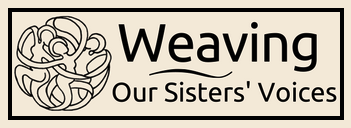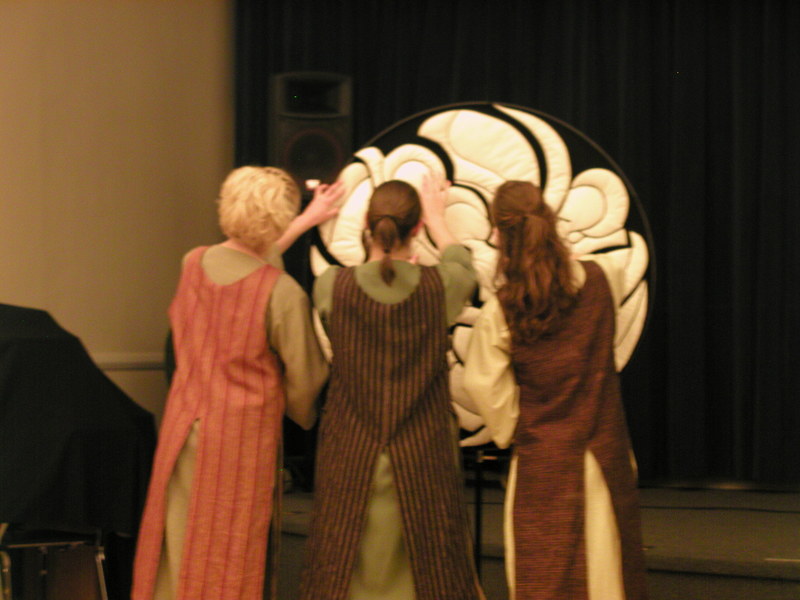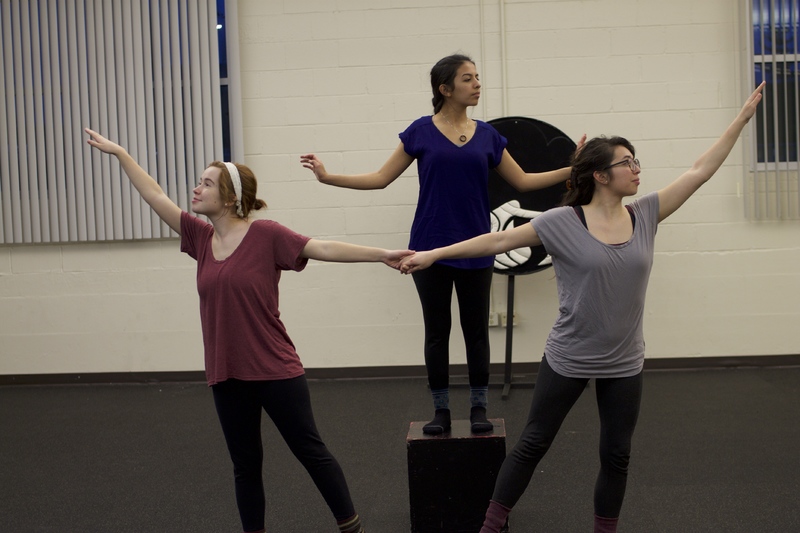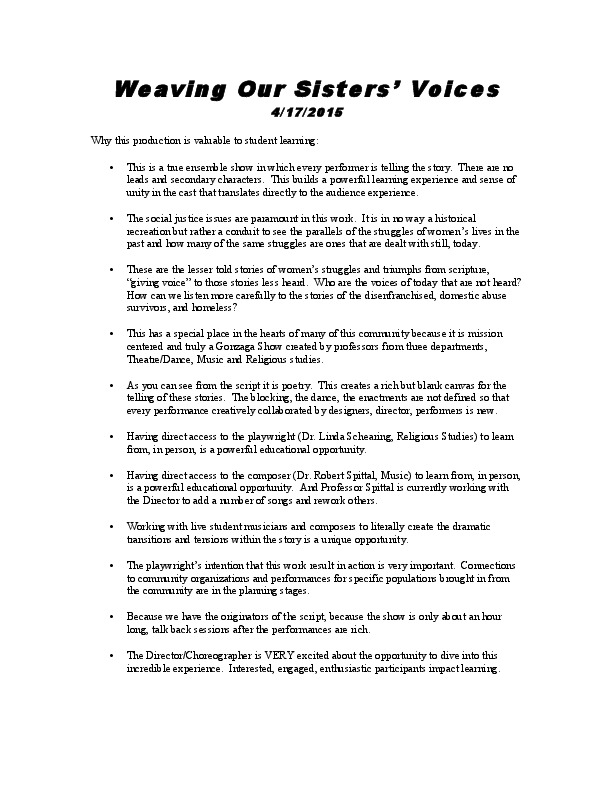Challenges of Producing Original Work
In addition to the glorious artistic challenges, there were other obstacles of a more practical nature. The 2006 tour's challenges were convincing others of its ‘unproven’ value, developing this ensemble style of theatre, and a lack of full departmental support. For the second production, the challenges came in the form of artistic opportunities: having a set that didn’t have to tour, additional performers, and live musicians. But for the 2015 production, a surprising and significant challenge was student perception of the value of producing Weaving Our Sisters’ Voices in addition to a truncated rehearsal period.
The 2006 tour was not part of the regular season, and I was an adjunct instructor without many of the avenues to obtain funding for additional projects. My program director and Dean ultimately supported my enthusiasm, but my challenges also extended to the community. I worked to book performances at ten different venues. Each one required introductions, conversations, articulations, and affirmations that setting aside time to publicize this performance would be of benefit to the organization. I am grateful that I got enough support from Gonzaga that I could offer the performance for free, because otherwise these various social organizations may have had a hard time setting aside funds for an ‘unknown’ production.
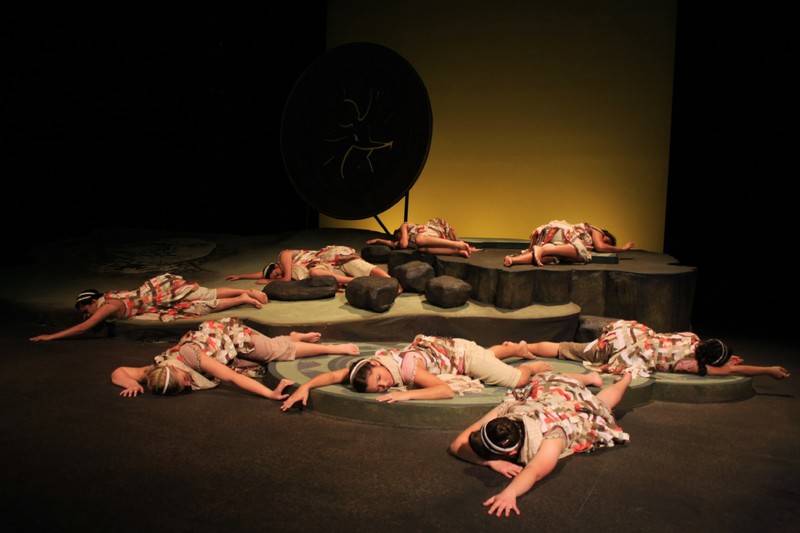
Photo courtesy of Leslie Stamoolis and Courtney Smith.
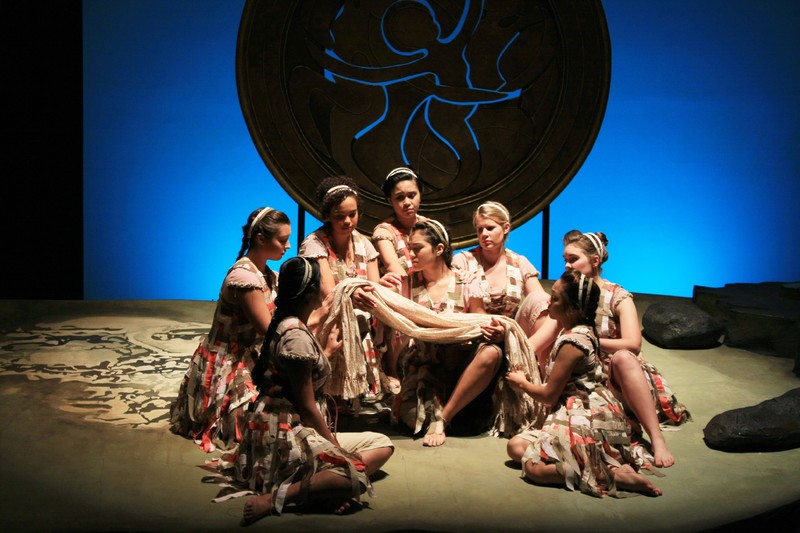
Photo courtesy of Leslie Stamoolis and Courtney Smith.
Jump forward to Fall 2014. Many changes had happened with the faculty and staffing of the Theatre Arts Program, and now in fact it was a Theatre and Dance Department with its own Chair. I was working with the Chair, Kathleen Jeffs, on a production of Jesus Christ Superstar as mentioned in The Initial Inspiration. As a department, it came to our attention that the following year the University would be moving the Fall Family Weekend up two weeks. This was very impactful for our department: we always had a show during Fall Family Weekend, because historically it sold out. As we pondered what could be possibly produced well in the short window of four weeks of rehearsal in a University setting, Weaving Our Sisters’ Voices came to mind. Of course I knew I wanted the opportunity to direct it again, and none of the current students would have been around the last time it was produced.
I am one who certainly likes a challenge, and while my colleagues were shying away from directing in that time frame, I was excited to see if it could be done. There was a general sigh of relief at my enthusiasm and an interest in the production. Plus a new colleague was hungry to devise a show around the subject of spirituality, so they appeared to go well together in a season of ‘new’ work.
While the decision was made relatively early, we debated as a department when to announce. I had found in the past that typically when one was in the throes of a production with me as director they were having an educational and positive experience, and so often students wanted to know what I would be directing the following year so they could get excited about it along with me. Because of the success of Jesus Christ Superstar, I petitioned my department to allow me to share the season with this large cast so that they could get excited. I announced to everyone in the middle of our sold-out run and was shocked by the lack of response. I chalked it up to uncertainty, but typically if someone enjoys working with me and I enthusiastically endorse the next project they are along for the ride at least open mindedly enough to want to find out more. No one asked any questions and time marched on.
A month later it became apparent that the students were somehow irate that we had chosen that show and not a musical. Our department had always done musicals every other year, but somehow this group didn’t know that. I even learned later that they were going to send around a petition to have students sign to convince us not to do the show. Strange! I did understand that some were concerned that it was an all-woman show. Leslie Stamoolis tells a great story of a conversation with a female actor who was livid about this point. The student eloquently and vehemently was arguing why it was so unfair that men were not included. Leslie gently educated this student that actually men typically get plenty of opportunities to perform and that perhaps she was arguing something that doesn’t really need to be argued for. I think it is wonderful that somehow this student was oblivious to the fact that most scripts are written for and about men.
In time, it became apparent that there were two students who seemed to have the biggest problem with the decision and I was thrilled when they actually came to talk with me (after much prodding from my colleagues). Quite frankly, I still don’t understand the venom, but I also knew that Weaving Our Sisters’ Voices is important work to do and it was a delightful solution to a calendaring challenge of an early Fall Family Weekend.
In all honesty, this experience really challenged my confidence. In some ways, I was incredulous and could logically look at my years of experience and their youth and write off the whole thing. But it hurt. I enjoy giving my all to my students and seeing them rise through challenges and surprise themselves with their capabilities. How could my intentions and the intentions of my colleagues be so disregarded? This experience stung even as rehearsals began but I certainly didn’t share that with my cast. But what it did give was new meaning to the words in the production. I was feeling vulnerable and to direct my students to say the lines such as:
Sister, your actions took courage. For this I commend you.WSV Courage
I too felt the courage of these women from the past. And with each passing rehearsal and the development of this cast, I knew this was the right play to be doing at this moment in time for these students and for this department.
*The following text I wrote and made available to the students to help them try to understand why I thought this was an appropriate show for our department and for their education. In some ways I thought much of what was included here was obvious, but I was told that it was helpful and not necessarily obvious to everyone. This realization also helped me rethink the importance of writing these experiences into this site.
Suzanne Ostersmith
